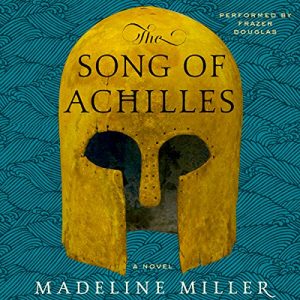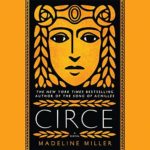Narrated by Frazer Douglas
Not too long ago, I recommended Circe (Madeline Miller, narrated by Perdita Weeks) to you. I said that while the story was great, the narration elevated it to sublime. In the case of The Song of Achilles, while I love love loved the novel (truly, it’s in my top ten books of all time), and I enjoyed the narration, Douglas’ interpretation slightly misses the mark. He becomes Patroclus (the story is loosely based on his role in The Iliad, except it’s told exclusively from Patroclus’ first-person perspective). Unfortunately, Douglas’ portrayal of Achilles and his bitter goddess mother, Thetis (who plays a pivotal role), are less successful. For that reason, the narration grade falls short of an ‘A.’ But don’t let that deter you from this story. Please. TSoA is magical and moving. I cried when it ended and kept compulsively repeating the last thirty seconds or so until I finally got it out of my system. It’s horrible and wonderful and awful and lovely, too.
I knew nothing about Achilles or Patroclus – or really, let’s keep it real, much Greek mythology – before I read TSoA (I listened to it before I listened to Circe), and I found it beneficial to research the pair (and many of the secondary characters) while listening. I don’t think my review will spoil your listening experience, but if you aren’t familiar with these closely linked Greek mythological figures and would rather learn about them on your own before listening to Miller’s romanticized (and widely accepted) interpretation of their relationship, you should stop reading now. Spoilers ahead.
In The Iliad, a defiant (sulking) Achilles withdraws from the battlefield at Troy after he’s insulted by his overreaching commander-in-chief, Agamemnon (Agamemnon takes one of Achilles’ slave girls, Briseis, after he’s forced to relinquish one of his own). Achilles refusal to fight allows the Trojans to nearly prevail (his intention all along). But when he learns that his best-beloved friend, Patroclus, has been killed by the Trojan prince Hector, he can no longer remain on the sidelines. Heartbroken and angry, a mourning and devastated Achilles hides Patroclus’ body away in his tent and returns to the battlefield. His savage ferocity helps bring about an end to the Trojan War, but not before he slays Hector in revenge, and is himself killed by an arrow to his heel. In TSoA, Miller uses this brief glimpse of the relationship between Patroclus and Achilles as the cornerstone of her story, detailing their relationship up to those fateful days at Troy.
When Patroclus meets Achilles, he’s a young former prince, recently exiled to the kingdom of Phthia. Patroclus accidentally killed a young boy who was intent on bullying him, and his father, long resigned to disappointment over his timid and strange son, is happy to be free of him. Phthia, ruled by King Peleus, is home to many such exiled boys. Quiet and awkward, the shy Patroclus finds it hard to fit into the boisterous group, and he struggles with guilt and horrific memories of the boy he killed. His loneliness comes to an end when the golden-haired Achilles, “best of all Greeks,” (son of King Peleus and the sea goddess Thetis), seeks him out as a companion and friend. Opposites in every way, at first Patroclus isn’t sure he can trust Achilles’ kind overtures. But as days and months and years pass, they grow up alongside one another, becoming loyal and steadfast friends.
The first real test of the relationship comes when a teenage Achilles is sent away to the mountains to train with the famous centaur Chiron. Devastated by the loss of his closest companion, a desperate Patroclus flees the palace and follows. Unbeknownst to him, Achilles dawdled – hoping Patroclus would join him. The two happily spend the next few years living and learning from Chiron, who becomes a father figure of sorts to both, and also falling in deeply in love. Their sojourn with Chiron comes to an abrupt end with the outbreak of the Trojan War. Thetis snatches Achilles away in the dead of night and hides him on the island of Skyros, hoping to avoid the prophecy that says Achilles will die at Troy. She’s never liked or accepted Patroclus, and jealous of his connection to Achilles, she purposely leaves him behind. But as we learned early in this story, the bond between Patroclus and Achilles is unshakeable and where he goes, Patroclus follows. He pleads with King Peleus to reveal his son’s location. Unfortunately, he isn’t the only one searching for Achilles; not long after the pair are joyfully reunited, Odysseus arrives. He tricks Achilles into revealing himself, and eventually convinces him to join the Greek armada sailing for Troy.
TSoA gives viewers an extraordinary inside view into the bond between Achilles and Patroclus – intense and powerful and beautiful – juxtaposed against the events detailed in The Iliad, and it’s all the more impressive because it’s almost wholly invented by this uber-talented author. Patroclus is an astute observer, always slightly in the periphery, who never quite understands why Achilles chose him, but is grateful nonetheless. He’s gentle, kind, quiet and lovely and good; the complete opposite of his beautiful and charismatic, stubborn and often proud lover. Although Achilles was praised for his skill as a warrior, Patroclus nurtures the private man – the musician who plays haunting melodies on his lute, who helps Patroclus rescue women captured in battle, who cherishes and loves Patroclus, and never wants to be separated from him. Told in a series of vignettes, TSoA is an intimate and unflinching portrait of two men whose sole desire is a long life lived together, thwarted by fate and prophecies, and the whims of the Gods. Secondary characters – bitter Thetis, and lovely Briseis, a girl Achilles claims as a war prize who becomes a close friend to Patroclus (and is the source of eventual acrimony between Achilles and Agamemnon) – play pivotal and scene stealing roles in this story, enhancing and refining our view of both men. For better or worse.
Frazer Douglas perfectly captures the Patroclus of my imagination. A slightly awkward introvert who constantly questions the events and powerful figures of his day, Patroclus comes to life in Douglas’ performance. It’s an A+. Unfortunately, he’s less successful voicing Achilles – the other major figure in this story – and I could never shake the sense he sounded like a teenage boy playing at being an adult. Achilles, as Miller renders him, is comfortable in his own skin (which, by the way, is handsome and beautiful), self-assured and mature… and the portrayal simply doesn’t evoke that. He also struggles with the female roles, especially Thetis, whose raspy voice simply sounds like she needs to speak up and clear her throat. Briseis is similarly ‘off,’ – although in this instance, I just think Douglas’ voice doesn’t lend itself to femininity. He pitches his voice higher, but it still sounds like a man trying to parody what an older girl/woman might sound like. Overall, I enjoyed his performance, but it could be better.
Friends, the love story between Patroclus and Achilles is tender and affecting, and ultimately, heart breaking. From the vividly rendered settings and characters, to the epic love story at its heart, TSoA is a new all-time favorite. The audio version is a lovely complement to this tremendous story. Highly recommended.
Em
Buy The Song of Achilles by Madeline Miller on Amazon




